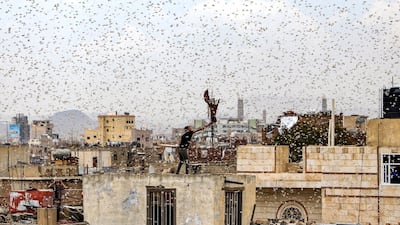Locusts have plagued western Yemen this winter, severely damaging agriculture and harming people's livelihoods in the conflicted country.
Years of war and food shortages have driven 14 million people on the brink of famine in Yemen.
The Tihama Plain in western Yemen is an important food-producing area.
The crops there grew well this year with adequate rain but a sudden locust plaque greatly reduced crop yields.
Locusts are also a delicacy in Yemen.
During swarms, markets from Sanaa to Aden teem with people snapping bags of locusts to take home and toast. In a swarm in September, prices for a bag dropped from $70 to $12.
But the insects hit pastures hard and the plague has seriously threatened Yemen's food security and the survival of local farmers and herdsmen.
"The problem is not confined to the crops," said Abdul Azim Ismail, deputy director of the Agriculture Office.
"Locusts not only affected the harvest of millet and corn but also ate the pastures of livestock and destroyed the hives of bees. In other words, they jeopardised agricultural production in terms of both plants and animals.
"Thanks to the adequate rain this year, many people were expecting a good harvest of grain but now they can only survive by selling livestock."
This summer, locusts swept nearly half of Yemen's eastern and central parts.
The UN's Food and Agriculture Organisation repeatedly warned that if no anti-locust action were taken, the winter breeding of the desert locusts would deal a devastating blow to western farming areas.
But due to years of war, the Yemeni government was unable to organise a large-scale and effective locust control operation.
"We are confronted with great obstacles," said Adel Sheibani, director of the Desert Locust Control Centre in Yemen.
"The main problem for locust control workers is the security in some areas. We are unable to enter the main breeding area now."
The locust plague has not only reduced the local farmers' grain harvest this winter, but will also affect agricultural production next year, further exacerbating the famine risk.
Local experts have called on the international community to provide assistance.












